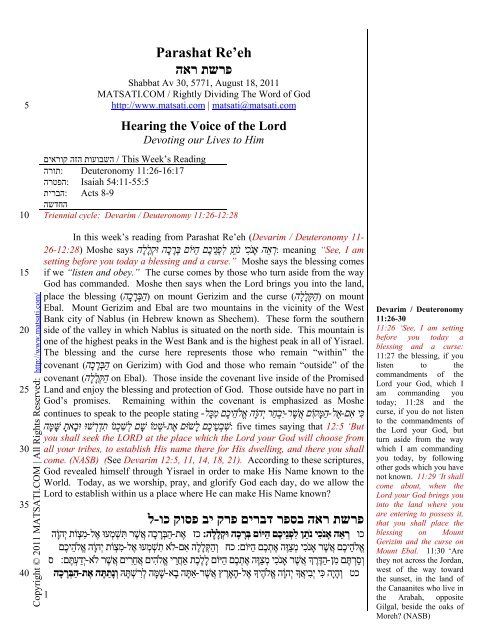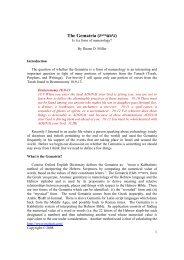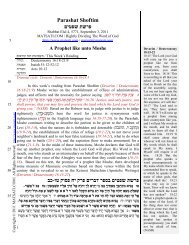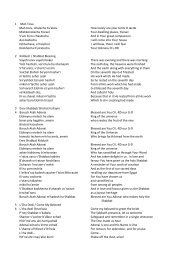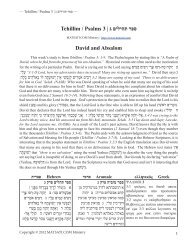Parashat Re'eh ר×× ×¤×¨×©×ª × -×× ×¤×¡×ק פרשת ר×× ×ספר ××ר×× ×¤×¨×§ ××
Parashat Re'eh ר×× ×¤×¨×©×ª × -×× ×¤×¡×ק פרשת ר×× ×ספר ××ר×× ×¤×¨×§ ××
Parashat Re'eh ר×× ×¤×¨×©×ª × -×× ×¤×¡×ק פרשת ר×× ×ספר ××ר×× ×¤×¨×§ ××
You also want an ePaper? Increase the reach of your titles
YUMPU automatically turns print PDFs into web optimized ePapers that Google loves.
5<br />
10<br />
<strong>Parashat</strong> Re’eh<br />
פרשת ראה<br />
השבועות הזה<br />
:תורה<br />
:הפטרה<br />
:הברית<br />
:החדשה<br />
Shabbat Av 30, 5771, August 18, 2011<br />
MATSATI.COM / Rightly Dividing The Word of God<br />
http://www.matsati.com | matsati@matsati.com<br />
Hearing the Voice of the Lord<br />
Devoting our Lives to Him<br />
/ This Week’s Reading קוראים<br />
Deuteronomy 11:26-16:17<br />
Isaiah 54:11-55:5<br />
Acts 8-9<br />
Triennial cycle: Devarim / Deuteronomy 11:26-12:28<br />
15<br />
20<br />
25<br />
30<br />
35<br />
40<br />
Copyright © 2011 MATSATI.COM | All Rights Reserved: http://www.matsati.com/<br />
In this week’s reading from <strong>Parashat</strong> Re’eh (Devarim / Deuteronomy 11-<br />
26-12:28) Moshe says ֹ רְ אֵה אָנ : meaning “See, I am<br />
setting before you today a blessing and a curse.” Moshe says the blessing comes<br />
if we “listen and obey.” The curse comes by those who turn aside from the way<br />
God has commanded. Moshe then says when the Lord brings you into the land,<br />
place the blessing כָה) (הַבְּרָ on mount Gerizim and the curse (הַקְּלָלָה) on mount<br />
Ebal. Mount Gerizim and Ebal are two mountains in the vicinity of the West<br />
Bank city of Nablus (in Hebrew known as Shechem). These form the southern<br />
side of the valley in which Nablus is situated on the north side. This mountain is<br />
one of the highest peaks in the West Bank and is the highest peak in all of Yisrael.<br />
The blessing and the curse here represents those who remain “within” the<br />
covenant הַבְּרָ כָה) on Gerizim) with God and those who remain “outside” of the<br />
covenant ( הַקְּ לָלָה on Ebal). Those inside the covenant live inside of the Promised<br />
Land and enjoy the blessing and protection of God. Those outside have no part in<br />
God’s promises. Remaining within the covenant is emphasized as Moshe<br />
continues to speak to the people stating<br />
: five times saying that 12:5 ‘But<br />
you shall seek the LORD at the place which the Lord your God will choose from<br />
all your tribes, to establish His name there for His dwelling, and there you shall<br />
come. (NASB) (See Devarim 12:5, 11, 14, 18, 21). According to these scriptures,<br />
God revealed himself through Yisrael in order to make His Name known to the<br />
World. Today, as we worship, pray, and glorify God each day, do we allow the<br />
Lord to establish within us a place where He can make His Name known<br />
1<br />
כִי נ ֹתֵן לִפְנֵיכֶם הַיּוֹם בְּרָ כָה וּקְלָלָה<br />
כִּי אִם -אֶל-הַמָּקוֹם אֲשֶׁ ר-יִבְחַר יְהוָֹה אֱֹלהֵיכֶם מִכָּל-<br />
שִׁ בְטֵיכֶם לָש ֹוּם אֶת- שְׁ מוֹ שָׁ ם לְשִׁ כְנוֹ תִדְרְ שׁוּ וּבָאתָ שָּׁ מָּה<br />
פרשת ראה בספר דברים פרק יב<br />
כו -ל פסוק<br />
כו רְ אֵה אָנ ֹכִי נ ֹתֵן לִפְנֵיכֶם הַיּוֹם בְּרָ כָה וּקְלָלָה: כז אֶת-הַבְּרָ כָה אֲשֶׁר תִּשְׁמְעוּ אֶל-מִצְוֹת יְהוָֹה<br />
אֱֹלהֵיכֶם אֲשֶׁר אָנ ֹכִי מְצַוֶּה אֶתְכֶם הַיּוֹם: כח וְהַקְּלָלָה אִם-ֹלא תִשְׁמְעוּ אֶל-מִצְוֹת יְהוָֹה אֱֹלהֵיכֶם<br />
וְסַרְ תֶּם מִן-הַדֶּרֶ ְך אֲשֶׁר אָנ ֹכִי מְצַוֶּה אֶתְכֶם הַיּוֹם לָלֶכֶת אַחֲרֵ י אֱֹלהִים אֲחֵרִ ים אֲשֶׁר ֹלא-יְדַעְתֶּם: ס<br />
כט וְהָיָה כִּי יְבִיאֲָך יְהוָֹה אֱֹלהֶיָך אֶל-הָאָרֶ ץ אֲשֶׁר-אַתָּה בָא-שָׁמָּה לְרִ שְׁתָּהּ וְנָתַתָּה אֶת-הַבְּרָ כָה<br />
Devarim / Deuteronomy<br />
11:26-30<br />
11:26 ‘See, I am setting<br />
before you today a<br />
blessing and a curse:<br />
11:27 the blessing, if you<br />
listen to the<br />
commandments of the<br />
Lord your God, which I<br />
am commanding you<br />
today; 11:28 and the<br />
curse, if you do not listen<br />
to the commandments of<br />
the Lord your God, but<br />
turn aside from the way<br />
which I am commanding<br />
you today, by following<br />
other gods which you have<br />
not known. 11:29 ‘It shall<br />
come about, when the<br />
Lord your God brings you<br />
into the land where you<br />
are entering to possess it,<br />
that you shall place the<br />
blessing on Mount<br />
Gerizim and the curse on<br />
Mount Ebal. 11:30 ‘Are<br />
they not across the Jordan,<br />
west of the way toward<br />
the sunset, in the land of<br />
the Canaanites who live in<br />
the Arabah, opposite<br />
Gilgal, beside the oaks of<br />
Moreh (NASB)
עַל-הַר גְּרִ זִּים וְאֶת-הַקְּלָלָה עַל-הַר עֵיבָל: ל הֲֹלא-הֵמָּה בְּעֵבֶר הַיַּרְ דֵּן אַחֲרֵ י דֶּרֶ ְך מְבוֹא הַשֶּׁמֶשׁ<br />
בְּאֶרֶ ץ הַכְּנַעֲנִי הַיּשֵׁב בָּעֲרָ בָה מוּל הַגִּלְגָּל אֵצֶל אֵלוֹנֵי מ ֹרֶ ה :<br />
45<br />
50<br />
55<br />
60<br />
65<br />
70<br />
75<br />
80<br />
85<br />
Copyright © 2011 MATSATI.COM | All Rights Reserved: http://www.matsati.com/<br />
This week’s Parashah begins with the Hebrew word רְ אֵה which is written<br />
in the singular form meaning “see” followed by כֶם הַיּוֹם a phrase<br />
containing the plural pronoun “you.” The text indicates that each person on an<br />
individual basis אֵה) ,רְ see) will be affected by the blessing and the curse. The use<br />
of the singular/plural language is to emphasize that the Torah has been given to all<br />
“who have ears to hear” and it is the personal responsibility of each individual to<br />
choose life, to hold onto the Lord God, to obey His voice, and to walk in God’s<br />
ספר 30. word in our daily lives as Moshe says in sefer Devarim / Deuteronomy<br />
אָנ ֹכִי נ ֹתֵן לִפְנֵי<br />
יט הַעִד ֹתִי בָכֶם הַיּוֹם אֶת-הַשָּׁמַיִם וְאֶת-הָאָרֶ ץ הַחַיִּים וְהַמָּוֶת נָתַתִּי לְפָנֶיָך הַבְּרָ כָה דברים פרק ל<br />
וְהַקְּלָלָה וּבָחַרְ תָּ בַּחַיִּים לְמַעַן תִּחְיֶה אַתָּה וְזַרְ עֶָך: כ לְאַהֲבָה אֶת-יְהוָֹה אֱֹלהֶיָך לִשְׁמ ֹעַ בְּק ֹלוֹ<br />
וּלְדָבְקָה-בוֹ כִּי הוּא חַיֶּיָך וְא ֹרֶ ְך יָמֶיָך לָשֶׁבֶת עַל-הָאֲדָמָה אֲשֶׁר נִשְׁבַּע יְהוָֹה לַאֲב ֹתֶיָך לְאַבְרָ הָם<br />
לְיִצְחָק וּלְיַעֲק ֹב לָתֵת לָהֶם<br />
: Devarim / Deuteronomy 30:19 ‘I call heaven and earth to<br />
witness against you today, that I have set before you life and death, the blessing<br />
and the curse. So choose life in order that you may live, you and your<br />
descendants, 30:20 by loving the Lord your God, by obeying His voice, and by<br />
holding fast to Him; for this is your life and the length of your days, that you may<br />
live in the land which the Lord swore to your fathers, to Abraham, Isaac, and<br />
Jacob, to give them.’ (NASB) According to these scriptures, there is no room for<br />
compromise in this decision making process to “choose life.” The Scriptures say<br />
“holding fast to the Lord is your life and the length of your days” showing the<br />
absolute necessity of living each day by the holding onto and drawing near to the<br />
Lord God Almighty.<br />
The blessing and curse is contrasted with Devarim / Deuteronomy 12:8<br />
that states “you shall not do at all what we are doing here today, every man doing<br />
whatever is right in his own eyes.”<br />
פרשת ראה בספר דברים פרק יב<br />
פסוק ח- יא<br />
ח ֹלא תַעֲש ֹוּן כְּכ ֹל אֲשֶׁר אֲנַחְנוּ ע ִ ֹש ֹים פּ ֹה הַיּוֹם אִישׁ כָּל -הַיָּשָׁר בְּעֵינָיו: ט כִּי ֹלא-בָאתֶם עַד-<br />
עָתָּה אֶל-הַמְּנוּחָה וְאֶל-הַנַּחֲלָה אֲשֶׁר-יְהוָֹה אֱֹלהֶיָך נ ֹתֵן לְָך: י וַעֲבַרְ תֶּם אֶת-הַיַּרְ דֵּן וִישַׁבְתֶּם בָּאָרֶ ץ<br />
אֲשֶׁר-יְהוָֹה אֱֹלהֵיכֶם מַנְחִיל אֶתְכֶם וְהֵנִיחַ לָכֶם מִכָּל-א ֹיְבֵיכֶם מִסָּבִיב וִישַׁבְתֶּם-בֶּטַח: [שני] יא<br />
וְהָיָה הַמָּקוֹם אֲשֶׁר-יִבְחַר יְה ֹוָה אֱֹלהֵיכֶם בּוֹ לְשַׁכֵּן שְׁמוֹ שָׁם שָׁמָּה תָבִיאוּ אֵת כָּל-אֲשֶׁר אָנ ֹכִי מְצַוֶּה<br />
אֶתְכֶם עוֹֹלתֵיכֶם וְזִבְחֵיכֶם מַעְש ֹ ְר ֹתֵיכֶם וּתְרֻ מַת יֶדְכֶם וְכ ֹל מִבְחַר נִדְרֵ יכֶם אֲשֶׁר תִּדְּרוּ לַיהוָֹה<br />
:<br />
According to the Modern Hebrew lexicon, the phrase הַיָּשָׁר בְּעֵינָיו appears to be a<br />
Hebrew idiom meaning “whatsoever is right in his own eyes.” Dissecting this<br />
phrase, ישר means “straight, even, level, smooth” and the word בעיניו is from the<br />
root word עין for “eyes” along with a preposition ב (“in”) and a type two<br />
pronominal suffix (“his”) so בעיניו is translated to mean “in his eyes.” The<br />
straightness of the eye is a way of describing the path one is taking, the choice<br />
that one is making in their life to choose life or to choose death, to walk with God<br />
or to walk contrary to what God has commanded. We walk where our eyes tell us<br />
to go. What we look at for extended periods of time is the direction our mind and<br />
2<br />
Devarim / Deuteronomy<br />
12:8-11<br />
12:8 ‘You shall not do at<br />
all what we are doing here<br />
today, every man doing<br />
whatever is right in his<br />
own eyes; 12:9 for you<br />
have not as yet come to the<br />
resting place and the<br />
inheritance which the Lord<br />
your God is giving you.<br />
12:10 ‘When you cross the<br />
Jordan and live in the land<br />
which the Lord your God is<br />
giving you to inherit, and<br />
He gives you rest from all<br />
your enemies around you<br />
so that you live in security,<br />
12:11 then it shall come<br />
about that the place in<br />
which the Lord your God<br />
will choose for His name to<br />
dwell, there you shall bring<br />
all that I command you:<br />
your burnt offerings and<br />
your sacrifices, your tithes<br />
and the contribution of<br />
your hand, and all your<br />
choice votive offerings<br />
which you will vow to the<br />
Lord. (NASB)
90<br />
95<br />
100<br />
105<br />
110<br />
115<br />
120<br />
125<br />
130<br />
Copyright © 2011 MATSATI.COM | All Rights Reserved: http://www.matsati.com/<br />
body will proceed into. According to Moshe, before entering into the Promised<br />
Land, each was doing what they thought was right in his/her own eyes.<br />
Therefore, the straightness of the eye was indicative of the way one walked before<br />
God. The warning is given just prior to Devarim 12:8 to destroy all of the idols<br />
and places of worship and to not do as the nations do when serving the Lord God<br />
Almighty. So the “straightness of the eye” is related to whether one is walking in<br />
righteousness or in sin. It is interesting, in the Ketuvei Shelachim (Apostolic<br />
Writings) Yeshua warned the people of the kind of treasure one seeks in this<br />
world drawing a parallel with whether the eye is good or bad in Matthew 6:20-23.<br />
<br />
θησαυρίζετε δὲ ὑμῖν θησαυροὺς ἐν οὐρανῷ, ὅπου οὔτε σὴς οὔτε βρῶσις<br />
ἀφανίζει, καὶ ὅπου κλέπται οὐ διορύσσουσιν οὐδὲ κλέπτουσιν: ὅπου<br />
γάρ ἐστιν ὁ θησαυρός σου, ἐκεῖ ἔσται καὶ ἡ καρδία σου. Ὁ λύχνος τοῦ<br />
σώματός ἐστιν ὁ ὀφθαλμός. ἐὰν οὖν ᾖ ὁ ὀφθαλμός σου ἁπλοῦς,<br />
ὅλον τὸ σῶμά σου φωτεινὸν ἔσται: ἐὰν δὲ ὁ ὀφθαλμός σου πονηρὸς<br />
ᾖ, ὅλον τὸ σῶμά σου σκοτεινὸν ἔσται. εἰ οὖν τὸ φῶς τὸ ἐν σοὶ σκότος<br />
ἐστίν, τὸ σκότος πόσον.<br />
Yeshua says “Ὁ λύχνος τοῦ σώματός ἐστιν ὁ ὀφθαλμός” “the lamp of the<br />
body is the eye.” The interesting point about the way Yeshua speaks here is his<br />
use of the “lamp” (λύχνος) with respect to the “body” (σώματός) and the “eye”<br />
(ὀφθαλμός). There are many parallels here in the Greek text. A lamp gives<br />
light for one to walk in the dark. One generally sins in the body in darkness so as<br />
to hide their sin, therefore darkness is paralleled with sin in the Scriptures (1 John<br />
1). Light also has a parallel with righteousness or walking in righteousness (1<br />
John 1). Yeshua says “ἐὰν οὖν ᾖ ὁ ὀφθαλμός σου ἁπλοῦς, ὅλον τὸ σῶμά<br />
σου φωτεινὸν ἔσται” meaning “if them your eye should be sincere (ἁπλοῦς,<br />
good, whole, single) entire body your giving light will be.” Yeshua contrasts<br />
saying “ἐὰν δὲ ὁ ὀφθαλμός σου πονηρὸς ᾖ, ὅλον τὸ σῶμά σου σκοτεινὸν<br />
ἔσται” meaning “but if your eye should be evil (πονηρὸς ᾖ) entire body your<br />
will be dark.” Note that the literal translation of the Greek text is a bit awkward<br />
but emphasis can be derived from the order of the words, the eye whether good or<br />
evil directs the body to be either light or dark. Yeshua is utilizing the Torah<br />
principle of the eye from this week’s study in sefer Devarim 12:8 in its use that<br />
refers to the one who chooses life. Is your eye good, are you walking in<br />
righteousness, have you chosen life Or, is your eye evil, are you walking in sin,<br />
have you chosen death Are you choosing to walk outside of the covenant of God<br />
that He swore to our Fathers Avraham, Yitzchak and Yaakov Do you<br />
understand the covenant that the Lord God made with you What kind of treasure<br />
are you storing up, the kind that brings life or death In these verses Yeshua is<br />
speaking of both the present and the future in his question on what treasure are<br />
you storing up To store something for future use is the way we prepare for<br />
difficult times to come. Moshe’s statements in this week’s Parashah on the<br />
blessing and the curse along with Devarim / Deuteronomy 30 speak of the future<br />
3<br />
Matthew 6:20-23<br />
6:20 ‘But store up for<br />
yourselves treasures in<br />
heaven, where neither<br />
moth nor rust destroys,<br />
and where thieves do not<br />
break in or steal; 6:21 for<br />
where your treasure is,<br />
there your heart will be<br />
also. 6:22 ‘The eye is the<br />
lamp of the body; so then<br />
if your eye is clear, your<br />
whole body will be full of<br />
light. 6:23 ‘But if your<br />
eye is bad, your whole<br />
body will be full of<br />
darkness. If then the light<br />
that is in you is darkness,<br />
how great is the darkness!<br />
(NASB)
135<br />
140<br />
145<br />
150<br />
155<br />
160<br />
165<br />
170<br />
175<br />
Copyright © 2011 MATSATI.COM | All Rights Reserved: http://www.matsati.com/<br />
and the conditions we need in order to live before the Lord God. What does the<br />
Lord God require of us We find out in Devarim 10:12-14.<br />
4<br />
פרשת ראה בספר דברים פרק י<br />
פסוק יב- יד<br />
יב וְעַתָּה יִש ֹ ְרָ אֵל מָה יְהוָֹה אֱֹלהֶיָך שׁ ֹאֵל מֵעִמְָּך כִּי אִם -לְיִרְ אָה אֶת-יְה ֹוָה אֱֹלהֶיָך לָלֶכֶת בְּכָל-<br />
דְּרָ כָיו וּלְאַהֲבָה א ֹתוֹ וְלַעֲב ֹד אֶת-יְהוָֹה אֱֹלהֶיָך בְּכָל-לְבָבְָך וּבְכָל-נַפְשֶָׁך: יג לִשְׁמ ֹר אֶת-מִצְוֹת<br />
יְהוָֹה וְאֶת-חֻקּ ֹתָיו אֲשֶׁר אָנ ֹכִי מְצַוְָּך הַיּוֹם לְטוֹב לְָך: יד הֵן לַיהוָֹה אֱֹלהֶיָך הַשָּׁמַיִם וּשְׁמֵי הַשָּׁמָיִם<br />
הָאָרֶ ץ וְכָל-אֲשֶׁר-בָּהּ<br />
לָלֶכֶת בְּכָל-) the Lord, to walk in all His ways (יִרְ אָה) Here the Torah tells us to fear<br />
) - לְבָבְָך ( heart and to serve Him with all our ,(לְאַהֲבָה א ֹתוֹ) to love Him ,(דְּרָ כָיו<br />
and all our soul ( - ). Devarim 10:12 summarizes beginning with fearing<br />
the Lord God. What does it mean to fear the Lord Are we to be afraid of God’s<br />
approval of us or be afraid of the future expectation of judgment According to<br />
the Scriptures, “the fear of the Lord is the beginning of Wisdom” (Mishley /<br />
Proverbs 9:10) since without fear we would not turn from our sins but would<br />
continue to walk in darkness.<br />
The Hebrew word translated as “fear” is יִרְ אָה has a range of meanings<br />
throughout the scriptures. The fear of the Lord as described in the Tanach is a<br />
designation for true devoutness to the Lord (see Mishley / Proverbs 1:7, Iyov / Job<br />
28:28, and Tehilim / Psalms 19:9). Fear is also synonymous with love and hope,<br />
not a slavish dread, but rather reverence towards God (Compare: Devarim /<br />
Deuteronomy 32:6, Hoshea / Hosea 11:1, and Yeshaya / Isaiah 1:2, 63:16, 64:8).<br />
The Lord God is also called "the Fear of Yitzchak" in sefer Bereshit / Genesis<br />
31:42 and 31:53 as it is translated as “the God whom Yitzchak feared.” Fear is<br />
also paralleled in the Ketuvei Shelachim (Apostolic Writings) as a way to prevent<br />
carelessness in ones faith and as an incentive leading to repentance (see Matthew<br />
10:28, 2 Corinthians 5:11, 7:1, Philippians 2:12, Ephesians 5:21, and Hebrews<br />
12:28-29). Based on these Scriptures, fear can lead to anticipation of danger or as<br />
a reference to the reverence of God. Therefore, according to the Scriptures, the<br />
fear of the Lord includes an overwhelming sense of glory, worth, and beauty of<br />
the Lord God Almighty. It is also interesting that fear אָה) (יִרְ appears to be<br />
derived from the root word רְ אֵה (see). Does the fear of the Lord come from a<br />
sense of seeing the power of God Should we fear the Lord God in the sense of<br />
being threatened by Him for our sins or are we to regard Him in wonder and<br />
respect These are important questions because the type of fear אָה) (יִרְ that we<br />
have will reflect upon how we walk in all His ways ( - ), love Him<br />
בְכָל-) and serve Him with all our heart ( - ) and all our soul ,(לְאַהֲבָה א ֹתוֹ)<br />
:<br />
בְּכָל<br />
לָלֶכֶת בְּכָל דְּרָ כָיו<br />
בְּכָל לְבָבְָך<br />
בְכָל נַפְשֶָׁך<br />
.(נַפְשֶָׁך<br />
Yeshua told us that unless one is born new having a spiritual rebirth one<br />
cannot see the kingdom of God in John 3:3 while he was talking to Nicodemus.<br />
<br />
ἀπεκρίθη Ἰησοῦς καὶ εἶπεν αὐτῷ, Ἀμὴν ἀμὴν λέγω σοι, ἐὰν μή τις<br />
γεννηθῇ ἄνωθεν, οὐ δύναται ἰδεῖν τὴν βασιλείαν τοῦ θεοῦ.<br />
Devarim / Deuteronomy<br />
10:12-14<br />
10:12 ‘Now, Israel, what<br />
does the Lord your God<br />
require from you, but to<br />
fear the Lord your God, to<br />
walk in all His ways and<br />
love Him, and to serve the<br />
Lord your God with all<br />
your heart and with all<br />
your soul, 10:13 and to<br />
keep the Lord's<br />
commandments and His<br />
statutes which I am<br />
commanding you today<br />
for your good 10:14<br />
‘Behold, to the Lord your<br />
God belong heaven and<br />
the highest heavens, the<br />
earth and all that is in it.<br />
(NASB)<br />
John 3:3<br />
3:3 Jesus answered<br />
and said to him,<br />
‘Truly, truly, I say to<br />
you, unless one is<br />
born again he cannot<br />
see the kingdom of<br />
God.’ (NASB)
180<br />
185<br />
190<br />
195<br />
200<br />
205<br />
210<br />
215<br />
220<br />
Copyright © 2011 MATSATI.COM | All Rights Reserved: http://www.matsati.com/<br />
Yeshua says “amein amein” (Ἀμὴν ἀμὴν) “truly truly” I say to you unless one<br />
is born from above (ἄνωθεν) he is not able to behold the kingdom (βασιλείαν)<br />
of God. The principle of “life from above” is revealed in God’s covenant and the<br />
process in which God would bless His people. The covenant was to bring the<br />
people to God and to teach them to trust Him, to delight in Him, and to be one<br />
with Him. The being born from above is God working in our lives to change us<br />
לְאַהֲבָה from the inside out because of His great love for us. Because it is written<br />
…“ love the Lord your אֶת-יְהוָֹה אֱֹלהֶיָך לִשְׁמ ֹעַ בְּק ֹלוֹ וּלְדָבְקָה- בוֹ כִּי הוּא חַיֶּיָך וְא ֹרֶ ְך יָמֶיָך<br />
God, by obeying His voice, and by holding fast to Him; for this is your life and the<br />
length of your days, …” The Lord loves His children as it is written in Yeremiyah<br />
-<br />
love you with an everlasting love and in chased ,חָסֶד) mercy/grace) I draw you to<br />
me.” According to Jeremiah, God the Father draws us to Himself. Yeshua<br />
believed the Scriptures and said in John 6:44 οὐδεὶς δύναται ἐλθεῖν πρός με<br />
ἐὰν μὴ ὁ πατὴρ ὁ πέμψας με ἑλκύσῃ αὐτόν, κἀγὼ ἀναστήσω αὐτὸν ἐν<br />
/ Jeremiah 31:2 says מֵרָ חוֹק יְה ֹוָה נִרְ אָה לִי וְאַהֲבַת עוֹלָם אֲהַבְתִּיְך עַל כֵּן מְשַׁכְתִּיְך חָסֶד I“<br />
τῇ ἐσχάτῃ ἡμέρᾳ. ‘No one can come to Me unless the Father who sent Me<br />
draws him; and I will raise him up on the last day. (NASB) God’s mercy takes<br />
action, taking us captive and leads us to the Savior Yeshua the Messiah. Being<br />
born from above is an action of creation by the hand of God as it says in John<br />
“not of אשר לא מדם ולא מחפץ הבשר אף לא מחפץ גבר כי אם מאלהים נולדו׃ 1:13<br />
blood, or of the will of the flesh, or of the will of man, but of God.” The Hebrew<br />
translation of the Greek says נולדו“ ”מאלהים meaning “from God he is born.”<br />
The reference here is to Word of God (John 1:1) becoming flesh (John 1:14). By<br />
being born new, God makes a place in our hearts through which He works His<br />
will in our lives. As a result, rather than fear אָה) (יִרְ the Lord in the sense of<br />
judgment, we fear the Lord understanding the mission of the Word of God,<br />
Yeshua the Messiah in reverence and awe. It is written<br />
“… love the Lord your God, by obeying His בוֹ כִּי הוּא חַיֶּיָך וְא ֹרֶ ְך יָמֶיָך<br />
voice, and by holding fast to Him; for this is your life and the length of your days,<br />
…” It says here in the Hebrew text ֹעַ בְּק ֹלוֹ“ ”לִשְׁמ means “to hear His voice” but<br />
5<br />
לְאַהֲבָה אֶת -יְהוָֹה אֱֹלהֶיָך לִשְׁמ ֹעַ<br />
וּלְדָבְקָה בוֹ<br />
בְּק ֹלוֹ וּלְדָבְקָה-<br />
the English translation says “by obeying His voice” and “ - ” meaning “to<br />
be devoted in Him” and the English translation says “by holding fast to Him.” To<br />
hear His voice is synonymous with obeying His voice. To be devoted to Him is<br />
synonymous with holding fast to Him. We hear the Word of God and we believe<br />
by faith (Romans 10:17). We hold fast to the Word of God because He is the<br />
length of our days, He gives us life. If we do not believe in Yeshua the Messiah,<br />
the Living Word of God (John 1:14) we are not obeying the Torah by hearing and<br />
obeying, and holding fast and being devoted to the Lord God. Have you listened<br />
and obeyed Do you have a blessing or a curse If you do not believe in Yeshua<br />
there is no salvation, no redemption, no deliverance from sin, there is nothing left<br />
but the curse. If you want to see the kingdom of God, receive redemption, and the<br />
forgiveness of sins, ask Yeshua to be Lord of your life. This begins the process as<br />
it is written in sefer Devarim 30 to “… love the Lord your God, by obeying His<br />
voice, and by holding fast to Him; for this is your life and the length of your days,<br />
…” Let’s pray!
Heavenly Father,<br />
225<br />
230<br />
235<br />
240<br />
I have studied Your Words in the Torah and see and believe that You have<br />
spoke to me personally of Your Messiah. Help me to understand the meaning of<br />
these Scriptures and the gift You have provided for me in Yeshua the Messiah,<br />
Your living Word. Please forgive me of my sins, have mercy because I believe<br />
Yeshua laid His life down for me. I believe what is written about Yeshua in the<br />
Torah and what is written in John 3:3, I want to be born from above, I want to<br />
hear your voice and hold fast to you Lord in Your Word, and in Yeshua. Cleanse<br />
me from all sin Lord in Yeshua’s name. I want to grow and I want to be filled<br />
with all of You Lord. Become and אש אכלה a “consuming fire” in my life for<br />
You. Help me to know You in the covenant You have made with. Help me to<br />
live according to Your will as it is laid out in the Scriptures. Sanctify me in Your<br />
holy Word Lord and in Your Son Yeshua. Thank You Lord for everything You<br />
have done for me. I give You the glory, the honor, and the praise forever and<br />
ever.<br />
In Yeshua’s (Jesus’) Name I pray!<br />
Amen<br />
245<br />
250<br />
255<br />
260<br />
265<br />
Copyright © 2011 MATSATI.COM | All Rights Reserved: http://www.matsati.com/<br />
What to pray:<br />
Ask the Lord to help you understand what it truly means to “fear the<br />
Lord” and to “walk in His ways.”<br />
6<br />
<br />
<br />
Ask the Lord to help you see, trust, and obey Him. Ask the Lord to help<br />
you “to hear His voice” and “to hold fast to Him.”<br />
Thank the Lord for lifting the burden of sin and revealing His truth in your<br />
heart.<br />
Be Blessed in Yeshua, Christ our Messiah!<br />
* * * * * * * * * * * * * * * * * * * * * * * * * * * * * * * * * * * * * * *<br />
:<br />
Hallelujah for our Lord, our Teacher, our Rabbi,<br />
“Yeshua” King Messiah forever and ever<br />
הללויה לאדוננו מורנו ורבינו ישוע מלך המשיח לעולם ועד


